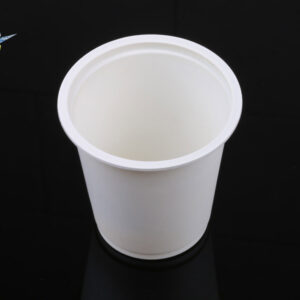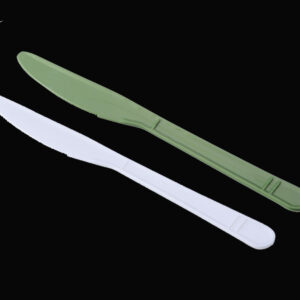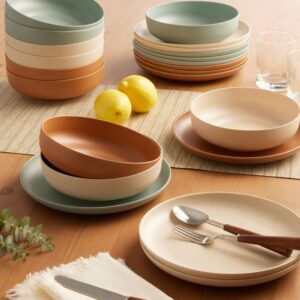
Welcome to our blog! Today, we’re diving into the exciting world of plant-based food packaging solutions and exploring how they can contribute to a sustainable future. Whether you’re new to the concept or already an expert, we invite you to come with us on a journey of discovery.
Introduction: A Brief Overview
The world is becoming more and more concerned about the impact that our daily choices have on the environment, the need for sustainable solutions has never been more crucial. One area that often goes unnoticed is food packaging. Traditional packaging materials, from plastic containers to Styrofoam plates, contribute to the global waste problem.
However, a green revolution is sweeping through the packaging industry, and plant-based options are emerging as a viable and eco-friendly alternative. Companies worldwide are embracing this shift, recognizing the benefits of plant-based food packaging for a more sustainable tomorrow.
The Problem with Traditional Packaging
Before we delve into plant-based packaging, let’s take a moment to understand the issues associated with traditional packaging materials. The most prevalent culprit is plastic, a durable material that takes hundreds of years to decompose. Single-use plastic containers and bags have inundated our landfills and oceans, causing irreversible damage to ecosystems and wildlife.
Another common offender is Styrofoam, a non-biodegradable material often used for food containers. Styrofoam takes up valuable landfill space and can release harmful chemicals when incinerated.
Beyond the environmental consequences, traditional packaging materials also pose health risks. Many plastics contain harmful additives, such as BPA, which can migrate into food and drink and may cause adverse health effects.
Plant-Based Packaging: The Future is Here
Amidst growing concerns about sustainability and health, plant-based packaging has emerged as a transformative solution. This innovative approach utilizes natural, renewable materials that are biodegradable, compostable, and, in some cases, even edible.
Plant-based packaging materials can be made from various sources, including corn, sugarcane, bamboo, wheat straw, and algae. These materials offer many benefits, ranging from reducing carbon emissions to promoting healthier lifestyles.
Benefits of Plant-Based Packaging
1. Reduced Carbon Footprint
One of the significant advantages of plant-based packaging is its reduced carbon footprint. Traditional packaging materials are typically derived from fossil fuels, which contribute to the emission of greenhouse gases and to climate change, plant-based materials are sourced from renewable resources, minimizing the environmental impact associated with their production.
2. Biodegradability and Compostability
Plant-based packaging materials are designed to break down naturally over time, returning to the earth without leaving behind harmful residues. Unlike plastic, which can persist in the environment for centuries, plant-based alternatives biodegrade within months or even weeks.
Furthermore, these materials are often compostable, which can be processed in industrial composting facilities, providing valuable nutrients for soil health. By embracing plant-based packaging, we can help divert organic waste from landfills and create a closed-loop system that benefits humans and the planet.
3. Healthier Choices
In addition to their environmental benefits, plant-based packaging also offers advantages for our health. Traditional packaging materials, such as certain plastics, can contain toxic chemicals that may migrate into the food or drinks they contact.
Plant-based packaging materials, on the other hand, are generally free from harmful additives and chemicals. By choosing products packaged in plant-based materials, we can minimize our exposure to potentially hazardous substances and make healthier choices for ourselves and our loved ones.
Embracing Plant-Based Tableware: Customization and Creativity
Now that we’ve explored the benefits of plant-based packaging let’s talk about the exciting world of plant-based tableware. From plates to cutlery, cups to straws, plant-based materials offer many possibilities for those seeking sustainable alternatives.
1. Customizable Options
Gone are the days of uniform white plastic cutlery and generic paper plates. Plant-based tableware provides a customizable and visually appealing alternative. Manufacturers now offer a variety of colors, sizes, and designs to suit any occasion or aesthetic preference. Whether you’re hosting a casual backyard barbecue or an elegant dinner party, plant-based tableware allows you to set the stage with style.
2. Innovation and Creativity
Plant-based packaging opens up a world of innovation and creativity in the design and production of tableware. Cutting-edge technologies are employed to develop unique shapes, textures, and patterns that enhance the dining experience. Imagine enjoying a meal on a plate made from molded bamboo fiber or sipping a refreshing drink through a straw crafted from plant-based bioplastics. The possibilities are endless!
3. Positive Consumer Impact
Choosing plant-based tableware benefits the environment and sends a powerful message to consumers. By opting for sustainable alternatives, you can inspire others and encourage a shift towards more conscious consumption. Whenever you host a gathering or provide plant-based tableware at your business, you contribute to the movement for a greener future.
Conclusion: Taking the Next Steps
In conclusion, embracing plant-based food packaging solutions is a significant step towards a sustainable tomorrow. By reducing our reliance on traditional packaging materials and opting for plant-based alternatives, we can minimize waste, decrease carbon emissions, and promote healthier choices.
As consumers, we have the power to drive change. By supporting companies that prioritize sustainable packaging practices, we can encourage further innovation in the industry. So, let’s embrace the green revolution and pave the way for a future where plant-based food packaging becomes the norm rather than the exception.
If you’re interested in delving deeper into this topic, we encourage you to explore the vast array of plant-based packaging options available today. Start small by swapping out single-use plastic containers for plant-based alternatives, or consider investing in plant-based tableware for your next event. Together, we can make a difference and create a more sustainable tomorrow.







